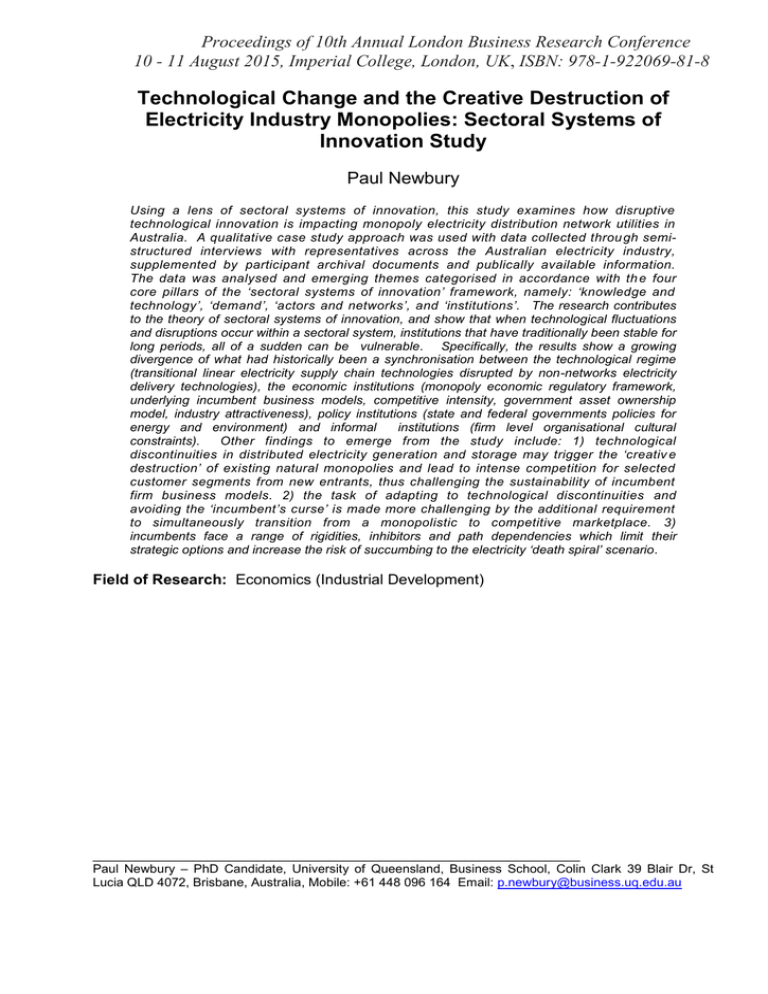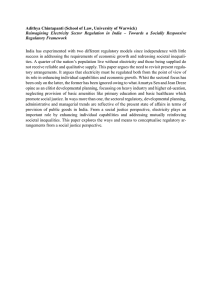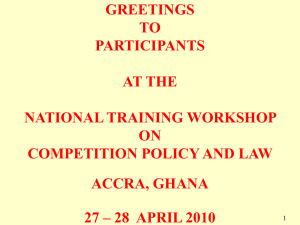Proceedings of 10th Annual London Business Research Conference
advertisement

Proceedings of 10th Annual London Business Research Conference 10 - 11 August 2015, Imperial College, London, UK, ISBN: 978-1-922069-81-8 Technological Change and the Creative Destruction of Electricity Industry Monopolies: Sectoral Systems of Innovation Study Paul Newbury Using a lens of sectoral systems of innovation, this study examines how disruptive technological innovation is impacting monopoly electricity distribution network utilities in Australia. A qualitative case study approach was used with data collected throu gh semistructured interviews with representatives across the Australian electricity industry, supplemented by participant archival documents and publically available information. The data was analysed and emerging themes categorised in accordance with th e four core pillars of the ‘sectoral systems of innovation’ framework, namely: ‘knowledge and technology’, ‘demand’, ‘actors and networks’, and ‘institutions’. The research contributes to the theory of sectoral systems of innovation, and show that when technological fluctuations and disruptions occur within a sectoral system, institutions that have traditionally been stable for long periods, all of a sudden can be vulnerable. Specifically, the results show a growing divergence of what had historically been a synchronisation between the technological regime (transitional linear electricity supply chain technologies disrupted by non-networks electricity delivery technologies), the economic institutions (monopoly economic regulatory framework, underlying incumbent business models, competitive intensity, government asset ownership model, industry attractiveness), policy institutions (state and federal governments policies for energy and environment) and informal institutions (firm level organisational cultural constraints). Other findings to emerge from the study include: 1) technological discontinuities in distributed electricity generation and storage may trigger the ‘creativ e destruction’ of existing natural monopolies and lead to intense competition for selected customer segments from new entrants, thus challenging the sustainability of incumbent firm business models. 2) the task of adapting to technological discontinuities and avoiding the ‘incumbent’s curse’ is made more challenging by the additional requirement to simultaneously transition from a monopolistic to competitive marketplace. 3) incumbents face a range of rigidities, inhibitors and path dependencies which limit their strategic options and increase the risk of succumbing to the electricity ‘death spiral’ scenario. Field of Research: Economics (Industrial Development) ____________________________________________________________________ Paul Newbury – PhD Candidate, University of Queensland, Business School, Colin Clark 39 Blair Dr, St Lucia QLD 4072, Brisbane, Australia, Mobile: +61 448 096 164 Email: p.newbury@business.uq.edu.au



